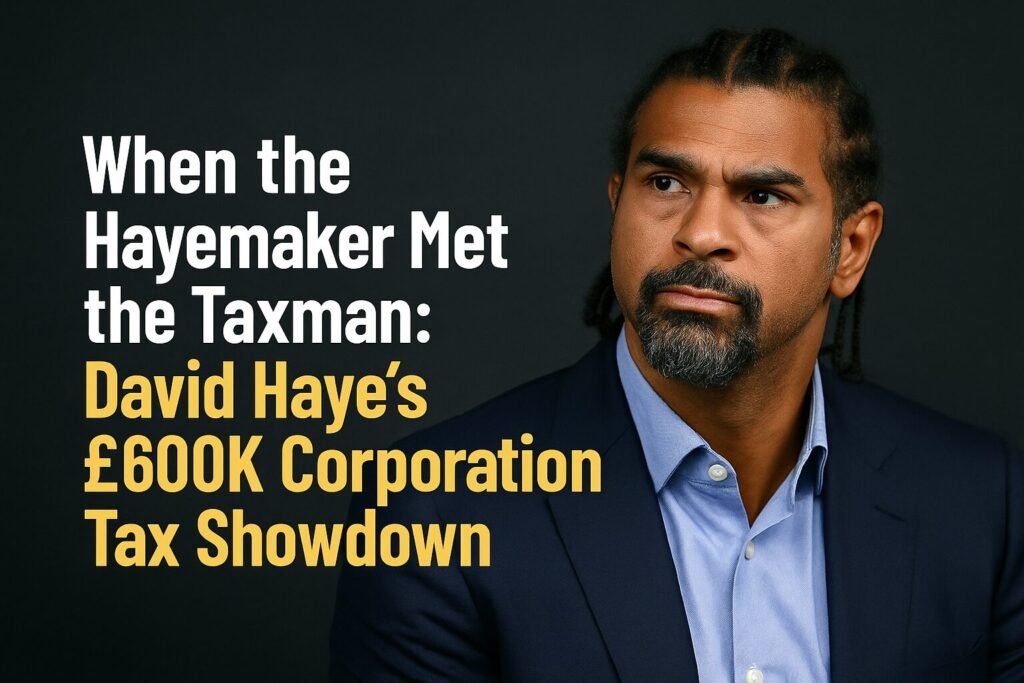David Haye has been many things in British boxing—world champion, pay-per-view headliner, promoter, pundit, and one of the most recognisable faces in the sport. Now, he’s in the headlines for an entirely different fight: a reported £600,000 corporation tax battle with HMRC, covering the years 2010 to 2013.
This David Haye tax case isn’t just a celebrity-in-trouble story. It’s a stark reminder that no matter how much you earn in the ring, the taxman will always have the final say—and the clock never stops ticking.
From Heavyweight Glory to the Courtroom Floor
When you think of David Haye’s career, you think of nights that defined an era of British boxing.
- Nikolai Valuev, 2009 – The night Haye out-boxed a man nearly a foot taller and almost seven stone heavier to become WBA heavyweight champion.
- Wladimir Klitschko, 2011 – The unification clash that captured global attention, even if the fight itself was one Haye would rather forget.
- Derek Chisora, 2012 at Upton Park – The infamous grudge match that drew 30,000 fans and settled one of the most heated rivalries in modern boxing.
- Tony Bellew, 2017 & 2018 – The two-fight drama that saw Haye return from injury, only to be beaten twice in emotionally charged nights.
And outside of his own fights, Haye stepped into the role of promoter, helping to stage big shows involving fighters like Chisora. On paper, it’s the profile of a man who should be financially secure for life. Which makes his current legal tangle with HMRC all the more baffling.
How Does a Star Boxer End Up in a Tax Tangle?
Fighters like Haye don’t just get paid for stepping into the ring. There are pay-per-view splits, international rights, sponsorship deals, appearance fees, merchandise, and promotional earnings. For someone who straddles both fighter and promoter roles, the income streams multiply—and so do the potential pitfalls.
Some of the biggest risk areas include:
- Complex Income Structures – Payments might come through multiple companies, overseas entities, or promotional arms. If the timing or reporting isn’t perfect, HMRC can see that as underpayment.
- Misjudging Deductions – Boxers and promoters have legitimate expenses—training camps, sparring partners, venue hire, undercard costs—but misunderstanding what qualifies could mean HMRC disallows large claims.
- Tax Laws Change Fast – Corporation tax rates, allowable expenses, and reporting rules can shift from year to year. If your accountant isn’t ahead of the curve, the backlog can build quickly.
- The Human Factor – Injuries, retirements, and comebacks can disrupt business planning. The years in question (2010–2013) saw Haye both at the peak of his career and navigating injuries and promotional ventures—an easy time for admin to slip.
The Reality for Athletes and Promoters
The David Haye tax case is a sharp reminder that fame doesn’t mean you’re bulletproof financially. In fact, athletes are often more exposed to risk than most people:
- Careers are short, and income can swing wildly from one year to the next.
- Many athletes trust their finances to advisers—sometimes without fully understanding what’s being done in their name.
- Public battles with HMRC can damage a reputation almost as much as a knockout loss.
Even with the millions earned from big fights, promotional work, and TV deals, a few years of poor planning or disputed filings can lead to a hefty court date.
Boxing Has Seen This Before
Haye isn’t the first high-profile fighter to clash with the taxman. Mike Tyson, Floyd Mayweather, and even Manny Pacquiao have all had public tax disputes. In the UK, former champions have faced similar situations—showing this is as much an occupational hazard in boxing as cuts and bruises.
The difference here is the scale and the timing. The reported £600K relates to a period when Haye was not just an active world-level fighter but also one of Britain’s most bankable sporting names. For HMRC, that makes it a high-visibility case.
Over to you: What’s your take—should successful athletes like Haye be held more accountable for their finances, or is this just another case of the taxman trying to cash in on a famous name? Share your thoughts in the comments, and for more in-depth boxing coverage, head over to CMBoxing.co.uk.

